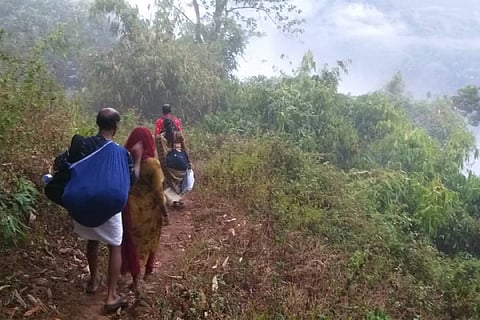

A steep, steep slope – three-and-a-half-kilometres long – stands between the 43 families of Araakappu and the outside world. The nearest shop and a vehicle to travel in are all outside the deep forest they live in. Their geographical location puts them in the Kuttampuzha gram panchayat of Ernakulam district but all their official records are in the Athirappally and Chalakkudy taluks of Thrissur district. The reason: it takes them a whole day to go to Thrissur district but it requires two days and crossing the Idamalayar river to reach Ernakulam. This has put them in a neither-here-nor-there situation. With that and all the hassles of being cut off from everything, most of the families want to move out.
“Members of Mannan, Ulladan and Muthuvan tribal communities live there. The Forest Department has granted them pattayam – land rights -- for two to 10 acres of land. The younger generation is so frustrated because even mobile phones have no range, and are keen to move out. They have identified a forest area called Vaishali Guha in Ernakulam district, where their ancestors had once lived, and have been trying to get rehabilitated there,” says Chithra Nilambur, tribal activist and president of Kerala Adivasi Aikya Vedi.
Going to the Araakappu hamlet to stay for a few days, Chithra experienced the hardships the people go through night and day. “There is no school, not even an anganwadi. If someone falls ill, they still have to climb this 3.5-km slope and then take a vehicle to go to the nearest hospital. If it is a sudden and severe illness like a heart disease, they will very likely not make it alive. Imagine the plight of the pregnant women or the elderly who will need to climb this slope for any hospital treatment. Coming back down this steep hill is also very, very difficult,” she says.
Tribal activist Chithra Nilambur speaks about the 44 families in Araakappu Hamlet, stuck between Ernakulam and Thrissur administrations, and cut off from the rest of the world because of a 3.5 km steep slope. #TribalLivesMatter pic.twitter.com/ySxNDYphYJ
— Cris (@cristweets) April 28, 2021
At the age of five, children in Araakappu are sent to the Vazhachal tribal hostel for their education and parents and kids go through pangs of separation.
“There are also dangers from attacks by tigers and elephants. A 70-year-old woman called Lakshmi Amma died from a tiger attack in 2019,” Chithra adds.
Things got worse after the floods of 2018 when there was a landslide in the area. People in Araakappu are farmers. The 2018 landslide destroyed several farms and the homes of three families. “These are not proper concrete houses but huts made of mud and asbestos sheets. But whatever happens, barely any of the authorities – Tribal Department or Forest Department or district administration – come down to this place since there is not even a road,” Chithra says.
With the help of Chithra’s Kerala Adivasi Aikya Vedi, the people of Araakkappu have sent pleas to the Forest Department in Thrissur and the district administration of Ernakulam to have them rehabilitated to Vaishali Guha. “They do not wish to move to a town but to another forest where they can live according to their faith and customs,” Chithra adds.
Climbing down the steep slope to the hamlet
However, a few of the families are also not keen on moving, says tribal development officer of Chalakudy, Santhosh Kumar. “Some time ago, at the Chief Minister’s Santhwana Sparsham (a government-initiated programme to settle issues of public through state ministers) in Thrissur, we gave a proposal to Rebuild Kerala for building a road to the Araakappu hamlet. It is estimated to cost about Rs 16-18 crore. It has been submitted to the Principal Secretary of the SC/ST Development Department. Regarding the rehabilitation, the final word has to come from the government’s side,” he says.
While they await the final word, about 25 of the 43 families in Araakappu are keen on moving to Vaishali Guha. “They said they will wait till June 20 and then move anyway. The tribal chief, Thankappan Panjan, said that it will at least be a temporary home for protecting themselves from the mudslides,” Chithra says.